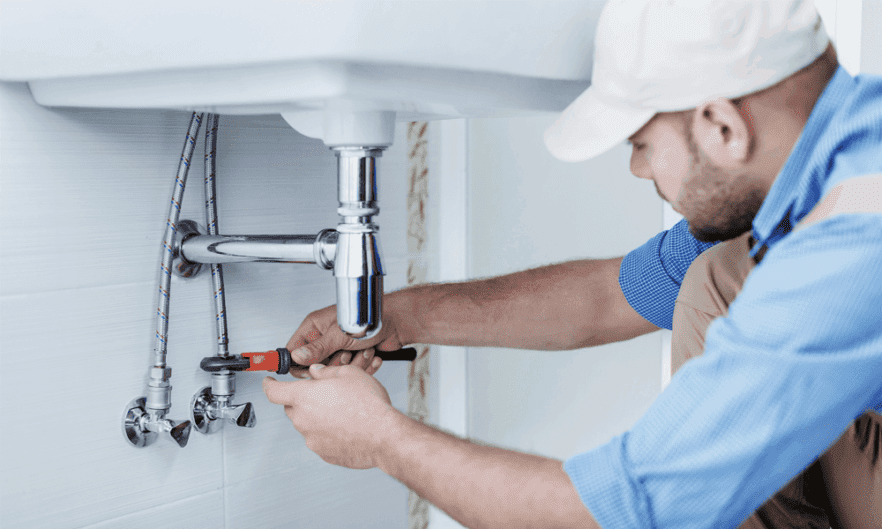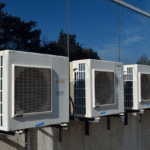If you have ever had a clogged pipe, you know how frustrating it can be. You may have tried using drain chemicals or cleaners to clear the blockage, but did they work? Do they harm your pipes in any way? Are these chemicals safe to use?
This blog post will explore the pros and cons of using drain chemicals and why plumbers may do a better job unclogging your pipes.
What Are Drain Chemicals And Some Common Examples Of Them?
Drain chemicals can clear clogged pipes by employing chemical reactions to remove the blockage. Most drain cleaners that you find on the shelves use strong chemicals to accomplish their intended purpose. There are many different types of drain chemicals on the market, and they can come in liquid, gel, and even powdered forms.
Specifically, drain cleaners work because they involve moving electrons around. The negatively charged electrons will flow towards the positively charged area, generating heat, which breaks down the clog.
There are three types of drain cleaners in plumbing: Caustic cleaners, Oxidizing cleaners, and Acidic cleaners.
● Caustic Cleaners – contain chemicals like lye and caustic potash, which are strong bases that give electrons to the clogging substances. The hydroxide ions created by this reaction remove the clog. The alkaline chemicals release heat, turning grease into soap removing the clog.
● Oxidizing Cleaners – chemicals like bleach, peroxides, and nitrates cause organic matter to lose electrons. So, these cleaners react with the clogged material and take the electrons from them. The reaction releases more heat and gas, which clears the clog.
● Acidic Cleaners – are less common chemicals typically sold to and used by plumbers. Usually, they contain high concentrations of sulfuric and hydrochloric acid. These chemicals increase the hydronium ions in a solution and attract electrons from the clog. This reaction also releases heat which can “melt” things like grease.
Most drain cleaners mention that you should wait 15 minutes or more before flushing the drain with hot water. If you use drain cleaners, read the directions and follow them to the letter. Some common examples of drain chemicals include:
● Liquid Plumr
● Drano
● Bio-Clean Drain and Septic System Treatment
You can buy these chemicals at most hardware stores or supermarkets; you will want to be cautious when using them. However, most, if not all, plumbers will tell you that you should refrain from using drain cleaners as they usually do more harm than good.
The Consequences Of Using Drain Cleaners
Clogs are a nuisance, and they happen to everyone; there seems to be no rhyme or reason to the predicament. When a clog occurs, you want to remove it immediately, so you search for a quick solution. Most homeowners’ first instinct is to grab some Drano and get to work. We heavily advise against drain cleaners as the downsides far outweigh the potential benefits.
Pipe Corrosion/Weakening
The consequences of using drain cleaners can be severe. For example, they can damage your pipes. The high temperatures of the chemical reactions in drain cleaners can cause the metal in your pipes to expand and contract. This repeated expansion and contraction will eventually lead to pipe failure. In addition, if you use drain cleaners often, you will eventually wear away the pipe’s lining. The loss of the lining will cause your pipes to corrode and could lead to leakage.
Leaving chemicals like Drano in your pipes for a long time, even if they treat stubborn clogs, only worsens the situation. Despite having corrosion inhibitors like sodium metasilicate in their formula, they aren’t strong enough to prevent corrosion.
Also, if you think that your pipes are safe because they are made from PVC, think again. Over time, using drain cleaners can weaken the interior wall of these plastic pipes and cause them to burst or crack. Drain chemicals can even eat away at the glue used to seal and connect plumbing pipes.
Burst Pipes
Unfortunately, since it would be impossible to tell which pipes are damaged, you could potentially have multiple leaks at one time, causing untold amounts of damage to your home. For example, a burst pipe can generate over $5,000 worth of damages; imagine having more than one.
Harmful To Your Health
Drain cleaners can also be harmful to you and your family. Some of the chemicals in drain cleaners are caustic, and their fumes can cause skin irritation, respiratory problems, and even blindness if ingested. So, it is essential always to use caution when working with these chemicals, even if you are following the directions. The best way to unclog your pipes is by using a plunger or calling a plumber.
Harmful To Your Septic
Most drain cleaners contain harsh chemicals like sulfuric acid and sodium hydroxide. These acids can be very harmful to your septic system. When these chemicals are dumped down the drain, they travel through the pipes and the septic tank. Once in the tank, they eat the sludge and scum built up over time. The acids also corrode the metal in the tank, leading to leaks.
In addition, the bacteria responsible for breaking down waste can die off from exposure to these chemicals, leading to a build-up of sludge and scum in your septic tank. The buildup will eventually max out your system, further damaging the structure and causing your septic system to fail.
If you are still not convinced that using drain cleaners is a bad idea, here are a few more reasons:
● They are expensive ($20 a bottle or more)
● They can be time consuming
● The results are often short-lived
● Not an eco-friendly method
What Are Some Safe Alternatives?
Unfortunately, while drain cleaners may be effective in some ways, they aren’t safe for the environment or your pipes. If you are looking for a safe and eco-friendly alternative to using drain cleaners, here are a few suggestions:
● Baking soda and vinegar – is a popular DIY remedy that many people swear by. To try it, pour a pot of boiling water down the drain, followed by half a cup of baking soda. Let it sit for a few minutes, then pour in a cup of vinegar. Cover the drain with a plug or bowl and let it sit for 30 minutes. Flush with boiling water.
This method uses two natural cleaners to break up the clog – baking soda and vinegar. The acid in the vinegar reacts with the alkaline in the baking soda to create carbon dioxide gas. The gas will help to break up the clog. The downside to this method is that it can be a little messy, and it may not work on more challenging clogs.
● Plunger – This tool is an old-fashioned but still effective way to unclog your pipes. You put it over the drain to use a plunger, ensuring that the rubber cup is completely covered. Then, plunge up and down vigorously for a few minutes. The plunger’s suction will create a vacuum and help break up the clog.
A Flange plunger, or a bell-shaped plunger, works better on clogged sinks because of the shape of the cup. This method is simple and effective and doesn’t use any harsh chemicals. It can be used on most clogs but may not be as successful on stubborn clogs.
● Water and dish soap – This is another simple method that you can use to unclog your pipes. Heat a gallon of boiling water on the stove while adding a cup of dish soap to the clogged drain. Let it sit for 15-30 minutes, then flush with boiling water.
This method uses the power of hot water and dish soap to break up the clog. The boiling water will help soften the clog, while the dish soap will help dislodge it.
Why You Should Call A Plumber Instead
When it comes to clearing clogged pipes, there’s no one more qualified to fix it than a plumber. Plumbers have the proper tools and training to deal with clogs quickly and safely. They also have the experience to know which clog-clearing method is best for your specific type of pipe. Finally, plumbers are insured and licensed, so you can rest assured that a professional will do the job correctly.
Plumbers also have the best chance of locating a clog that is hard to find. They will use their knowledge and experience in past jobs, but it also requires a bit of logic. Usually, a plumber will locate the clog in a trap or pipe leading away from the “last” non-working fixture downslope.
If you have problems with a clogged pipe, burst pipe, or any other plumbing issues, it’s always best to call a plumber. Not only will they be able to clear the clog quickly and safely, but they can also give you advice on how to avoid future issues.
Conclusion
When it comes to plumbing, prevention is always the best medicine. That’s why we urge our clients to hire a plumber before any significant issues arise. By catching minor problems before they become big ones, you can save yourself time, money, and a lot of hassle. If you need a reliable plumbing team for peace of mind, look no further than Pride Services.
We strive to bring you the best plumbing services in Rockville and the surrounding areas. You can count on us for all your repair, clogging, and installation needs. Our team of experts works diligently to provide top-notch plumbing services that meet your needs and exceed your expectations. So before your plumbing issues become an emergency, give us a call. We’ll be happy to help!








